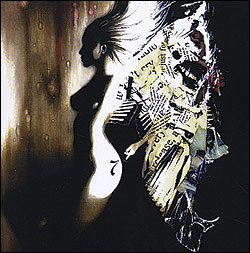ATMOSPHERE
Headshots: Se7en
(Rhymesayers)
The past six years have been good to Slug. The Minneapolis MC has emerged from the indie-rap morass to win the hearts of the Warped Tour crowd with his self-deprecating sincerity without sacrificing any of the swaggering authority that makes him the backpack underground’s best shot at producing an actual mainstream hip-hop star. But the reissue of Atmosphere’s 1999 cassette-only Headshots: Se7en, put together the year before the breakthrough Lucy Ford EPs, proves that Slug didn’t arrive fully formed. Slug and producer Ant were at an awkward crossroads between the battle-rap community that nurtured them and the introspective, intricate, vulnerable style they would develop. Slug is still making rookie blunders, cramming too many syllables into his stanzas and relying too heavily on punch lines. But the seeds of greatness are there. Slug delivers his witticisms with a spirited ferocity (“Please, fool, hella stupid I’m assuming/Probably couldn’t even rock your own family reunion”). And it’s fascinating to hear him self-consciously working out his contradictions, interrupting his childishly misogynistic pimp rap “Lyle Lovette” to denounce himself as an irresponsible asshole: “Motherfucker, you got a kid!” Like Slug’s persona, Ant’s production is a work in progress. His beats may not have the fluid grace of his more recent work, but tracks like “The Jackpot/Swept Away” have a greasy soul strut miles removed from the chilly dissonance of indie-rap contemporaries like El-P and Blockhead. Headshots: Se7en may not be a classic album, but it’s an intriguing document of a decent rap group on its way to becoming a great one. TOM BREIHAN
Atmosphere play Neumo’s with P.O.S. and Grayskul at 8 p.m. Thurs., April 14. $15 adv./$18.
MU
Out of Breach (Manchester’s Revenge)
(Output)
Mu—Maurice Fulton and Mutsumi Kanamori, the Paul and Linda of vomit disco—make the musical equivalent of a unicorn or a decent Christmas movie. Mu-sic is full of 1,000 mph hairpin turns and stylistic jump cuts but never stops grooving or feels like Frank Zappa shaking cookie crumbs out of his mustache. (Mr. Patton, please report to Room A4 for your audit.) Here’s where I bust a suspect critical move and surmise it must be a Japanese thing, like early Boredoms or Melt Banana—bands that went Dumpster diving for rock songs but instead came back with a toy ray gun and a soiled Lemony Snicket paperback. Except Mu are a “dance” band, and American Fulton’s apprenticeship in no-name house has made him one of the best rhythm programmers around, be it fat-assed go-go stomp (“Extreme”), old-school jack trax (“Paris Hilton”), or tribal-funk terror (“Throwing Up”). “Stop Bothering Michael Jackson” ends with skipping brushed snares, choral synths, and mournful stabs at a piano, a distressed bit of down-tempo. This follows a grinding diatribe about how people should just leave poor MJ alone that sounds like Kanamori is spitting out flaming ants. Kanamori is scary, and I say that with awe and respect. From her opening “Welcome to Mu world, bitch!” you feel like you are being led around a clubland as interpreted by H. Bosch by your dilated nostrils with a Yoko/Phyllis Diller mash-up for a guide. And if Out of Breach isn’t funnier and scarier than The Ring 2, I’ll eat a flaming ant. JESS HARVELL
ASTOR PIAZZOLLA
The Rough Guide to Astor Piazzolla
(World Music Network)
In a perfect world, this compilation would be wildly unnecessary, as everyone would already be familiar with Astor Piazzolla’s work and own every single one of his CDs and understand just what a genius he was. (Also, Freaks and Geeks would still be on the air and Aisha Tyler would be president.) But in this world, this is a pretty good, if imperfect, place to start your journey into the heart of Piazzolla’s classical/jazz/avant-garde/tango songs, suites, sonatas, and symphonies. The Rough Guide gets it roughly right, showcasing Piazzolla’s performance dexterity (he played his pieces on the button-accordion known as the bandoneón, accompanied by bands ranging from a quintet to an orchestra) as much as his composition skills. Nothing could sound more melancholy than the doom-haunted “Milonga de Angel”; nothing can out-frenzy “Libertango” or “Golazo”; and no piece of music from any genre can run the gamut like the live version of “Adiós Nonino” included here. The three “Tanguedia” pieces here are creepy and bizarre and filmic, and his duet with Gerry Mulligan on “20 Years Later” is contemplative, like two old monks talking. But nothing from 1986’s Tango: Zero Hour? His own favorite of the dozens of records he made? Curious. MATT CIBULA




